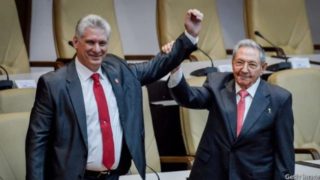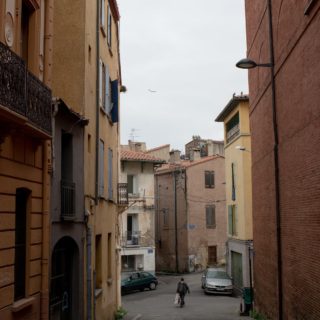ACCORDING TO THE Cuban constitution, the Communist Party is the “leading political force of society and of the state.” This means that it can set national policy. The first secretary of the Communist Party of Cuba—a post held successively by two Castro brothers (Fidel, then Raúl) for the past six decades—is officially the most powerful political position on the island. During Cuba’s Eighth Congress, which begins on April 16th, Miguel Díaz-Canel, Cuba’s current president and head of state, will probably replace Raúl Castro as first secretary and leader of the party. Is it the end of an era?
Not quite. Mr Díaz-Canel is a prolific tweeter, and one of his favourite hashtags is #SomosContinuidad (We are continuity); a reminder that despite not being part of the generation that founded the revolutionary regime, he has no plans to subvert it. Although many of the revolutionaries have died of old age, a handful still hold seats in the Politburo, and will probably keep the first secretary’s power in check. One closely watched point will be whether they all retire or some cling on.
Since the retirement of Fidel Castro in 2008, Cuba has been run by a military-bureaucratic complex of party cadres. One former Western diplomat compares it to a sandbox in which all the children want to build a castle, but can’t agree on what it should look like. Raúl Castro advocated a long-needed overhaul to revive the sclerotic command economy with market forces but many party bureaucrats have resisted. One of the main objectives of the upcoming Eighth Congress, beyond appointing a new first secretary, is to assess the progress that has been made in implementing economic policies adopted in 2011, which included allowing the sale of homes and cars, and taking companies out of direct government control.
“The economy will be the elephant in the room,” says William LeoGrande, a professor at American University. Cuba’s hugely important tourism industry has been pummeled by the coronavirus and, before that, by tightened sanctions from the Trump administration. Between 2016 and 2019 annual GDP growth was 1% at best, and the economy shrank by 11% in 2020. The reforms that were promised a decade ago have only partially been implemented and restrictions on the private sector only moderately been relaxed. The leadership has done more over the past nine months to speed up the pace of economic reform than it has in the past few years, largely because the island’s desperate economic situation required it. Still, it is plagued by inefficiencies and struggles to control things as trivial as the price of a scoop of ice cream.
Much of this inertia comes from conservatives who believe in slow, calculated reforms that must be patch tested and endlessly “perfected”. But Cuba also has more progressive leaders who respond to pressure from a more vocal, more connected and more heterogenous population. At times, the latter have even changed their minds following outbursts of public discontent. In 2018, the Minister for Work and Social Security stopped the implementation of new regulations that would have made it illegal for cuentapropistas, or the self-employed, to hold more than one licence to engage in private business, restricting them to one type of work. Still, the past ten years have been “a series of missed chances” that failed to gain President Díaz-Canel much respect or recognition from his people, notes a former European diplomat. The party must respond with a message of hope, and evidence of more comprehensive economic, social and political reforms.
“The oxygen of the leadership comes from consensus,” says Mark Entwistle of Acasta Cuba Capital, an advisory firm. But consensus in the party often means simply doing more of the same. After more than a year of acute shortages of food, basic medicines and hygiene products, plus blackouts, transport strikes and prohibitively priced internet connectivity, the island’s leadership, and its new first secretary, in particular, will have to think carefully about how much continuity its people can handle. Mr Díaz-Canel has so far proven not to be the reformer some Cubans hoped for. He may be able to enact more change in the top job, but he will still feel the presence of the old guard, including his predecessor. Raúl Castro has said that after he steps down as first secretary he will become “just another soldier defending this revolution.”
By The Economist





